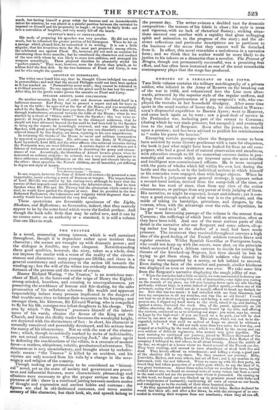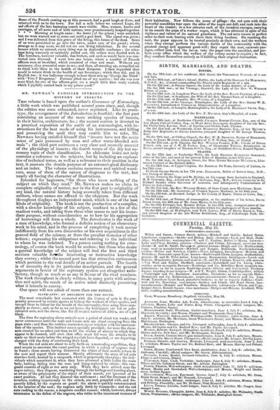MEMOIRS OF A SERGEANT OP THE FIFTH.
Tan little volume contains the military autobiography of a private soldier, who inlisted in the Army of Reserve on the breaking out of the war in 1803, and volunteered into the Line soon after- wards, attracted by the superior style of the regular uniform, and flying from the imperiousness of a pay-sergeant's wife, who em- ployed the recruits in her household drudgery. After some time spent in the usual routine of home duty, he embarked in WHITE- LOCK'S disgraceful expedition to Buenos Ayres; went to Hanover, and came back again as he went ; saw a good deal of service in the Peninsular war, including part of the retreat to Corunna; (during which he was made prisoner, but escaped ;) and eventually rose to the rank of Sergeant. Soon after the peace, he retired upon a pension ; and has been advised to publish his reminiscences to " make his purse the heavier."
Excepting certain passages where the Sergeant seems to have been assisted by some literary gentleman with a turn for eloquence, the book is just what might have been looked for from an old cam- paigner, who had a good deal of natural observation and steadiness, with education enough to fill the somewhat onerous duties in pen- manship and accounts which are imposed upon the most reliable and intelligent non-commissioned officers. He is more occupied with the parts of wholes which fall within his own ken during the battle and the march, or in the individual actions in which himself or his comrades were engaged, than with larger objects. When he does broach a judgment upon general strategy, it appears rather a second-hand notion, derived from the camp-talk of the time, or what he has read of since, than from any view of the entire circumstances, or perhaps from any power of truly judging of theta. His narrative, as might be expected, is curt and minute; yet it con- veys a good enough notion of what war is to the private, and the mode of taking its hardships, privations, and dangers, by the veteran, when, with the advantage over the eels, of repetition, he has got "used to it" all.
The most interesting passage of the volume is the retreat from Corunna ; the sufferings of which have still an attraction, often as they have been told. And one of the most curious parts of this detail is the narrative after our Sergeant and some others, cling- ing rather too long to the shelter of a roof, had been made prisoner. The treatment they received throughout conveys a high idea of the good feeling of the French soldiers towards brave and regular enemies. Whilst Spanish Guerillas or Portuguese louts, who could not keep up with the escort, were shot, on the principle which animated PARK'S African caravan to decide for cutting the throats of the knocked-up Negroes, lest time should be lost in trying to get them along, the British soldiers who fainted by the way were supported by a sentry, or left behind to recover. Even during the heat of the combat and pursuit, similar kindness was displayed as soon-as resistance was over. We take some bits from the Sergeant's narrative displaying the rough jollity of war.
"When the confusion had a little subsided, we were commanded to destroy our arms. I was standing viewing this work of destruction,—my right arm resting on the muzzle of my piece, my left arm hanging down upon my side bleeding profusely, without hope, in a state indeed of perfect apathy,—when one of the prisoners, seeing that I could not do it myself, offered to break my firelock for me. Now this was too much : it had travelled with me from Guernsey, had been my companion in all my troubles, and was like an old friend ! I could not bear to see it destroyed by another ; and feeling a sort of desperate energy possess me, 1 slipped my hand down to the swell, raised it up, and dashing it against a stone, fractured the stock. One of the guard, apparently an old soldier, observing the affair, very generously hound up my arm, and offering the canteen, cautioned us as to retracing our steps : you must, says he, return to Lugo by the high-road : if you are found on a by-path, you will be shot either by out men or the Spaniards. This advice, which was not to be dis- regarded, indicated that until we arrived at Lugo we should be without a guard. • • * • We did not walk more than two miles the first day, and stopped at a building by the road-side, which was filled by the enemy and our own soldiers of different regiments, who seemed very quiet together. The next morning we continued our journey, joined by William Harwood of the baud, commonly called Billy, Lintwhite of the grenadiers, John Barker of the company I belonged to, and others, in all about twenty. About the middle of the day, we stopped at a house where we found several of the French cavalry. They were cooking, and seemed to have abundance of stock both live and dead. They kindly offered us refreshment ; and killing a sheep, a good part of the shoulder fell to my share. We then resumed our journey. Billy, Lintwhite, Barker, and some others, had set off first ; and I, my mutton in my haversack, with the rest followed. When we came up with the first party, we found they had taken possession of a milch-goat, which, to say the least of it, was great wantonness. About three miles before we reached the town, having walked about one, we beard an unusual noise of many voices, but from a curve in the road could not see the persons from whom it proceeded. On coming up to this bend, we found our way blocked up by peasants armed with forks and other implements of husbandry, vociferating all sorts of curses on our head., and consigning us to the custody of their three hundred devils. "As they approached and pushed at us with their forks, Barker declared he would face them all; and after a few blows, he with the strongest of us suc- ceeded in wresting their weapons from our assailants; when they all ran oft
Some of the French coming up at this moment, had a good laugh at them, and returned with us to the town. For full a mile before we entered Lugo, the sad effects of the late harassing march were visible. Men, women, horses and carriages, of all sorts and of both nations, were promiscuously heaped together.
• • Morning at length came : the doors [of the prison) were unlocked, but we were warned not to come out until a gun fired. The signal was given ; and I was delivered from this grave of the living, this house of the dead. Some of us were permitted to go into the town, under care of the guard ; where, strange as it may seem, we did not see one living inhabitant. In the several houses which we entered, every thing was in deplorable confusion : the wine- taps being wantonly or carelessly pulled out, the cellars were flooded with it. The furniture, however valuable, was broken, and such as would burn was con- verted into firewood. I rent into one house, where a number of French officers were at breakfast, which consisted of wine and meat. Without any ceremony, they presented some to me; and then, all standing up, compelled me to drink with them to the health of their Emperor. I then requested they would in return drink to the health of our Sovereign ; which they did, and in English too: it was ludicrous enough to hear them mix up George the Third' with Vive Empereur.' Fortune jilted me of my mutton ; but she was now more kind, for one of the officers gave me a smart little ham ready cooked, which I joyfully carried back to my prison-yard."



























 Previous page
Previous page